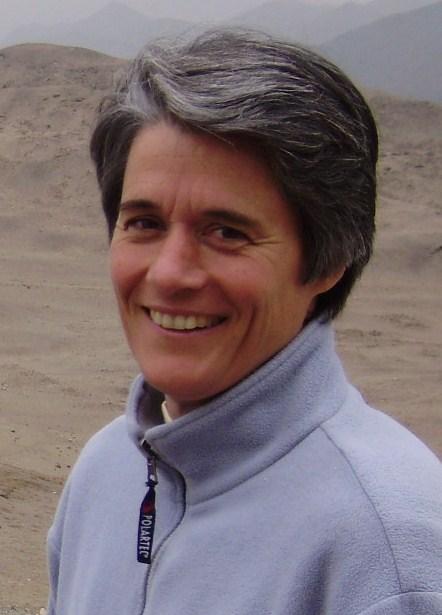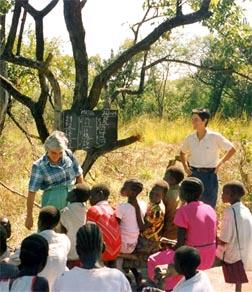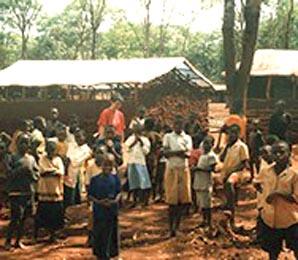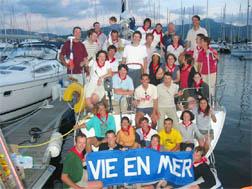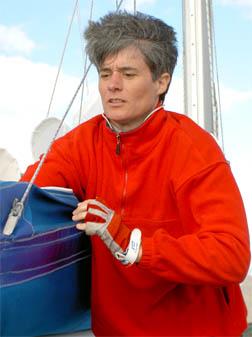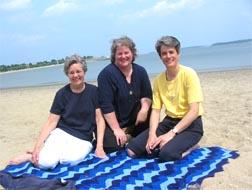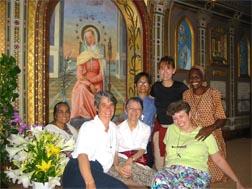I completed my final year of secondary school at the Collège du Sacré Cœur, Nantes, because I had been sent away from my school, and my mother, who had already had that experience with two of my sisters, said: “With such a school record, no one will accept you in your last year. There is only one institution where we might succeed in having you enrolled, that is the Sacred Heart of Nantes,” where in fact my two sisters had landed under the same conditions!
I will remain marked for my whole life by the difficult interview which I had with the principal, a Religious of the Sacred Heart, before being accepted. She ended with this unforgettable statement: “it is not because two of her sisters were difficult, even impossible, that I should not refuse Florence another chance. Every child has the right to be given a chance."
It was through this experience that I understood the charism. Each one is unique, Christ loves each one. That sister said this and tried to live it out daily with the children entrusted to her care.
And thanks to that remark, “Every child has the right to be given a chance”, five years later I began my career with a degree in Electronic Engineering in my pocket, and after another four years in this field, I entered the Society of the Sacred Heart – for life!
It was an irrational and inexplicable call.
I chose the Sacred Heart rather than another congregation, because I wanted one of Ignatian spirituality, structured in a way as to be able to live in today’s world. And I was attracted by these women who draw their strength from their contemplation and interior life.
In addition, they live this same charism in the four corners of the world and in every culture.
A heart the size of the world but also capable of remaining close to the forgotten and the ones wounded by life, and I myself have experienced this.
Before my final profession in 1994, I was sent to Manila. This experience has been the most significant of my life. I discovered the poverty of the Filipinos – these people with whom I had previously worked as an engineer. The fact of living with Religious of the Sacred Heart, who had points of cultural reference other than my own allowed me to see this country with “an Asian eye” and not a western one, and to become aware how different are our ways of looking at the world, and how this country had suffered so much from western domination. That gave me ‘an intercultural fibre’, a taste and desire to understand why we are so different and how the spirituality of the Sacred Heart is lived out in other cultures.
After my profession, I set out for Uganda with JRS (Jesuit Refugee Service). I joined Lolin, another RSCJ, who had a long experience of Africa. We lived together for two years in a refugee camp for Sudanese.
The radicality of our life, in the midst of a camp and of a great poverty, human as well as spiritual, taught me detachment. I had just made my profession, committing myself to live simply and without attachments, and I discovered how far from this I was, how millions of men and women live it, without having a choice, and how, I on my side still had my ‘comforts’.
When I returned to France, I looked for a way to use my experiences – those of the Philippines and those of the refugee camps – at the service of youth: making it possible for them to live this experience of the shock of cultures, at the service of the poorest, far from the modern world. I worked for several years in the DCC (Délégation Catholique pour la Coopération), with young people who want to give two years of their life helping in less favoured countries. I was happy to accompany them on their journey, guiding them so that they might overcome difficulties. Then I spent some years in a student hostel, where our mission mainly consisted in accompanying overseas students in their discovery of French or western culture.
In France we were many who, with other Ignatian congregations, wanted to reach out to the youth in their leisure time since this is a moment when they are more ‘open’. So I invested myself in summer activities, linking the ocean and prayer. With some friends, we created the camps of “Life on the sea, entry into prayer”. As a Breton, I had learnt to sail when I was young, and I passionately love sailing. These summer camps allow the youth to discover prayer in the context of holidays and sport, with an apprenticeship of team work: sharing and respect. Sailing is an educative sport. Through it, one learns to overcome oneself, respect for nature, meditation. Moreover, many marine metaphors illustrate the spiritual life very well: hold the course, lower the moorings, launch out into the deep, stop over, correct, etc. I love adventure, open air, the immensity of the sea. You must have deep roots if you want to go far. I love the idea of being at the frontier and I am happy to belong to a Body, a family, where everyone helps me, day after day, to discover the Love of God for me, and for each one, whatever may be their activity.
In 2007, I was named Provincial of the French Province. There is no preparation for this kind of mission. However, my experience as councillor in the Provincial Council, my hours of listening to the youth, and my recent stay in Boston, where I followed a course in human relations (in psychology, conflict management and communication)...all this helps me day after day.
My priorities are: pastoral work with the youth, presence to the less favoured, strong apostolic community life, dialogue between the generations in the Province, the building of Europe.
In the midst of the renewal of the Church in France, I am struck by the dynamism of the youth, the blossoming of new communities. It is difficult, even disconcerting to adapt to the youth, but we have no choice.

